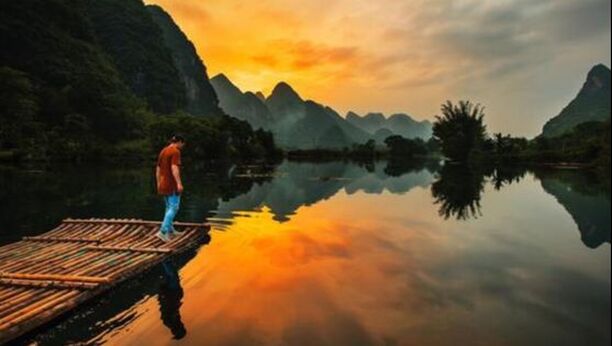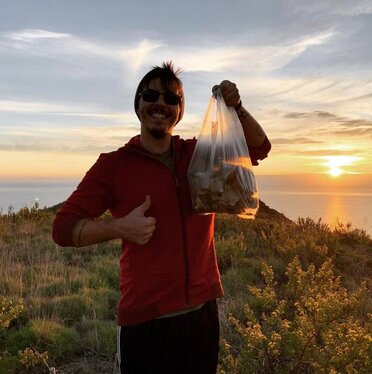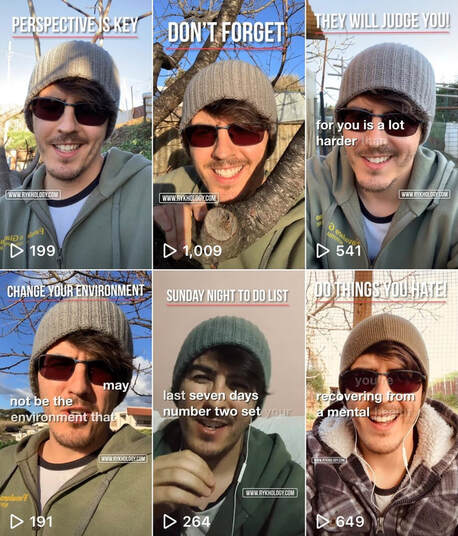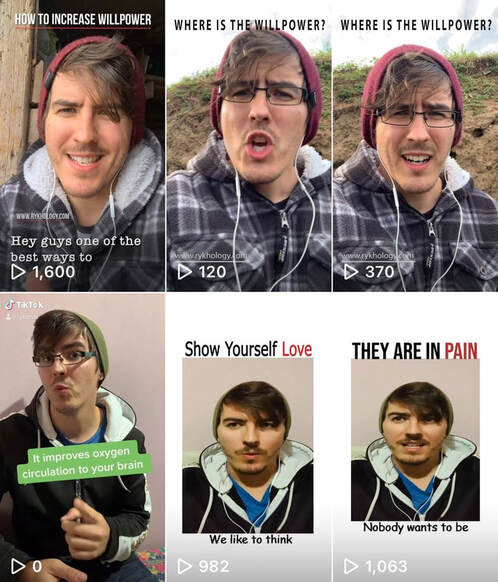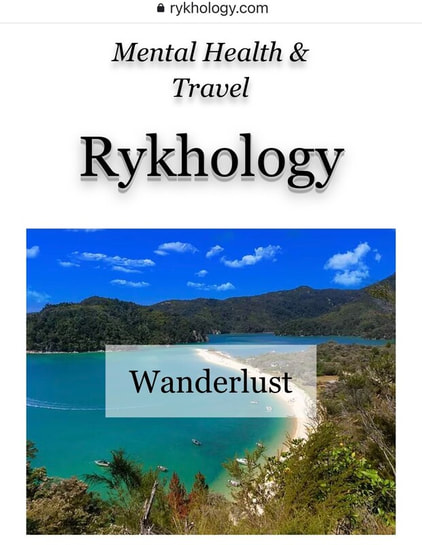|
Have you ever had that "crazy" idea where you quit your job and travel the world? Me too! For us, this is fun thought that is soon rejected due to "responsibilities" and fear. When Ryan Coyle had this idea, he went for it. Now, this is his every day life. In this exclusive 10 question interview, learn how Ryan quit his job, became a digital nomad and dedicated his life to helping people! 1. Who are you and where are you from? I’m Ryan and I'm from Dublin, Ireland. I currently live in Lipari which is an island off of the coast of Sicily. Trying to sum up who I am isn’t easy! I went to university and obtained a degree in International Relations before working in pensions. However, after nearly two years stuck in an office staring at Excel sheets I had to escape. That’s when I left and backpacked around Italy before spending a full summer in Sicily. After that I walked the Camino De Santiago through Portugal before backpacking around South America. My main interests involve travelling, reading, animals and exercising. 2. What do you do for a living? (What is a digital nomad?) When I initially quit my office job all I had was my savings. I never planned on becoming a digital nomad, I didn’t even know what a digital nomad was! However, before I traveled to South America I returned home to visit my family and dog. While in Dublin a friend of a friend was looking for a cheap web designer to remodel his company’s website. I taught myself to design websites back in university as a way to make money to party! So I took the job and redesigned the website. I saw that the company had no social media presence and I successfully convinced them that they needed to start producing content for social media. Long story short, I was able to backpack around South America while being paid a small fee every week for managing the social media pages of the company back in Dublin. Also on the side I’m a stock market investor and although this doesn’t supplement my income as I consistently reinvest my profits, it means that my savings are growing year on year which provides comfort knowing that I could potentially live this life for many years to come. 3. How did you hear about and get into this? When I started my nomadic lifestyle I set up a blog called The Wayfaring Wanderlusters, which no longer exists. But through interacting with the travelling community on Instagram and Twitter I heard about this thing called a digital nomad and it intrigued me. The only problem I had was that I had no idea how to make money while backpacking. Web development never even entered my mind or managing social media accounts. However, when I was back in Dublin and accepted the website design job I realized that I could pitch the idea of social media manager and finally live the dream of being paid while I travel! Most digital nomads are not entrepreneurs or six figure bloggers. They are people like me who were driven enough and cheeky enough, to convince a company to pay them while they travel! 4. Do you have a home? If not, how/where do you live? No. I’m technically homeless. At this moment due to the pandemic I live with my girlfriend's parents in Lipari. We arrived on January 1st 2020 to look after the fields and animals while her parents took a once a lifetime trip to Australia to visit her father’s family. However, by the time their trip was meant to end in March, Italy was in the throes of the first wave. Her parents were trapped in Australia, Italy went into lock-down and I had to adapt to life as a long term farmer. This meant preparing the fields for the summer crops. I’m a city boy so this was a sharp learning curve! I don’t plan on settling down anytime soon. I want to return to South America and maybe live in Bolivia and Argentina for a while. If I do get a place of my own, it will probably be a van that I’ll convert for habitation but who knows what the future holds! 5. How do you pay taxes and get health insurance? Health insurance is easy, every year I take out a global travel policy which covers me for illness and injury worldwide. It also covers lost or stolen goods up to €4,000. The policy itself only costs me about €50 a year and I’m covered by a company based in Ireland which is still technically my country of residency. Taxes haven’t been an issue for me as yet. When I was working as a social media manager (the job was lost due to the company closing as a result of lock-down in Ireland) the taxes were stopped from my paycheck automatically by Irish Revenue. This is standard practice in Ireland. Everyone has their taxes stopped automatically from their paychecks so that we never have to worry about filing taxes. In relation to paying taxes on my stock market earnings, that is a far more complex subject that many books have been written about! Although what I can say simply is that the tax brackets in Ireland start around €12,000 so anyone earning less than that a year pays no tax on that income. Taxes start on all the money earned over €12,000. I am unfortunately not wealthy enough to generate that sort of annual income from my investments, yet! So for 2021 I don’t foresee me needing to pay taxes unless I get my social media job back after coronavirus or find another income source. 6. What is your favorite and least favorite part about living as a digital nomad? My favorite part is the freedom. For the most part you can work your own hours and decide where you sleep and wake up the next day. If you don’t want to stay in Buenos Aires anymore, you can always go to Rio De Janeiro for a few days or weeks! You can really live a life of true freedom and never feel like work is making you miss out on what life has to offer. My least favorite part is working on the internet. If you find yourself in a place with poor internet, you are going to suffer heart palpitations trying to work as the connection drops in and out. You constantly have to worry that where you are going will have good enough internet to work. And if you get a call from your boss and you can’t connect, your boss is rightly going to be less than happy! And this sort of leads into the issue of working through time zone differences. I remember the night before I climbed Machu Picchu that I arrived at the hostel at midnight, exhausted and hungry, with the prospect of hiking up a mountain at 6am the next morning so I was less than happy. Then I realized that due to the time difference that I would have to wake up at 3am to work. That sort of stuff is soul crushing, it doesn’t matter how much you have always wanted to see Machu Picchu, in that moment, all you want is to sleep. Sleep deprivation is a real issue while living the nomadic life. It isn’t unusual to not sleep properly for days. I know that’s three negatives but they are all intertwined and I don’t feel I can mention one without the other two. 7. Do you think you’ll always be a digital nomad or are you open to someday working a typical 9-5 job? Why? I cannot accept the idea of working a 9-5. I’d rather live poor and homeless for the foreseeable future at least than fall back into the soul crushing grind of a 9-5. I know my lifestyle isn’t for everyone, but it is for me. I’d rather work 16 hours a day for me, earning a pittance than work 9-5 for someone else making bank! I never wore my suit to work when I worked in pensions. I always got changed in the office, why? Because one day I saw myself in the mirror at home while washing my face before work and I was dressed all dapper in my best suit. I was to give a presentation that morning about pensions and I realized that I had grown up to become everything I always hated. I had become a suit wearing adult that grew up, abandoned my dreams for money and spent all day working with money. I knew that 16 year old me would have been disgusted with where I ended up. So I stopped wearing my suit at home, I couldn’t look at myself in it. That may sound dramatic to many but I’m a fiery person. I’m all or nothing. I’m either obsessed with a passion for something or totally numb to it. I have no middle ground. Plus, I find this lifestyle leaves you on edge a bit because you never really know when your money could be used up. You never know what is around the corner. You never know when you’ll see a plus sign in your bank statement again. That drives you to innovate and create like you never could if you knew you had a paycheck coming in at the end of every month. I like the challenge to myself in this life. That challenge has led me to expanding my work on social media to raise awareness of mental health issues and to even start writing a book about my mental health journey! 8. Would you recommend this lifestyle to young adults? Why? That’s a tough one. I’m not just a travel writer but also a mental health blogger and on the mental health side I always tell people to follow their hearts and do what sets their soul on fire. It saddens me to see so many young people feel that they need to go to university, that they need to study a course that will one day get them employed (or that they think will get them employed) and then work for 40 years to build a good pension so that they can finally enjoy life. But at the same time I’m aware that many people simply wouldn’t enjoy the insecurity and madness of being a digital nomad. It’s not as easy a life as Instagram makes it seem. It’s tough and stressful. But for me, a normal life is tough and stressful so I might as well get to see the world a bit while I’m stressed out! My recommendation to all young people is to ask themselves what they would do if money was no issue for them. Then do that. Chase that dream through your teens and twenties. If it doesn’t work out you’ll still only be thirty and I can guarantee that you’ll have had a wild ride! I also recommend travelling as much as humanly possible and learning about different cultures, languages and people. Travelling in this way helps your brain to develop in different ways and will make you more mature, confident and self assured. At the very least, this is stuff that future employers and a future spouse would like to see in you. You don’t need to be a nomad to travel either. There’s always weekend getaways and holiday leave from work. 9. What tips or advice would you give to those of any age thinking about becoming a digital nomad? Be cheeky. One of my favorite sayings is the wheel that squeaks gets the oil. If you don’t make a lot of noise about yourself and your abilities it’s too easy for people to overlook you. Remember I didn’t get offered a digital nomad job. I had to create the job and then sell it to the company! You need to be creative and then you need to be cheeky enough to sell your idea to someone who will be willing to pay you. Otherwise, if you have a talent or a gift such as writing you can become a blogger but it’s not easy. I have never made a penny in many years of writing. These things take time. You must be patient in nurturing the life that you want. There is no such thing as an overnight success. I made over 50 YouTube videos before any of them got a view that didn’t come from me or my girlfriend. Only recently have other people even realized that I’m on YouTube. So be patient and stick with it. Finally, and this applies to older people more than the younger crowd who won’t have as much in savings, but learn the basics of trading and invest your savings while you’re travelling. The average return on the S&P 500 over the last 100 years is 10% per annum. You will never find a bank offering such juicy returns. Don’t leave your money in the bank because the rate of interest rarely beats inflation and that means your money is literally devaluing while you travel. Learn to travel thrifty and invest the rest. 10. With the experience and knowledge gained by living such a unique lifestyle, what advice would you give to the younger generations and what advice would you give the older generations (if different)? Beyond everything else I’ve said I want to say that if you let all the fears and negative thoughts in your head about this lifestyle propagate in your mind, you will not be able to live this lifestyle. This lifestyle is tough sometimes. It’s beautiful and freeing but it’s tough. Many of your fears will come true and many won’t. For example, most tourists and travelers fear being robbed. I have never been robbed. But two guys did try to mug me in Quito one night and I was able to fight them off. In Santiago we took a wrong turn and ended up being swallowed by a large crowd of anti government protesters. Next thing we knew there was water cannon spraying us, the armed police opened fire upon us and we got tear gassed. We managed through blindness and a hacking cough to get away from the trouble but if you told me that I’d have gone through that I would not have gone to Chile. But it’s one of my favorite and most exciting life stories! I also loved Chile and I will return one day. When you travel you are outside all of the time, you are somewhere new every day, you are seeking adventure. Sometimes when adventure finds you it isn’t the sort of adventure being peddled on Instagram. Sometimes it’s tear gas and bullets. Embrace it! Embrace the chaos of the nomadic lifestyle and see every event as an adventure, as a learning moment and as a future story that one day people in bars will hang on your every word. Travelling makes you a story teller because it puts you into situations that most people never find themselves in. But that is part of the lifestyle. All in all, there are so many great career choices out there. This one may seem out of reach, but it's not and Ryan has proved that. So, I'll leave you with one of my favorite Jim Carey quotes: “You can fail at what you don't want, so you might as well take a chance on doing what you love.” Thank you for reading! Like this article? Maybe you'll like this one too:
"10 Questions With: An Independent Contractor" Comments are closed.
|
Greg SmolkaGreg is a Grand Rapids, Michigan native with a passion for personal growth. Archives
August 2023
Categories
All
|
|
More Pages
|
Greg Smolka
Greg is a Grand Rapids, Michigan native with a passion for personal growth, investing, and business.
|
Recent BLOG Posts
|

